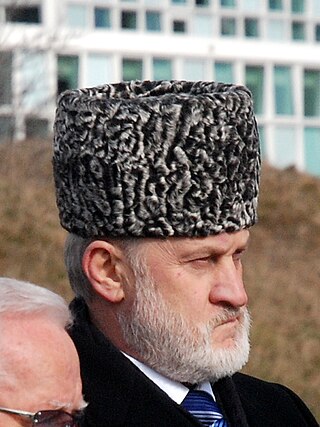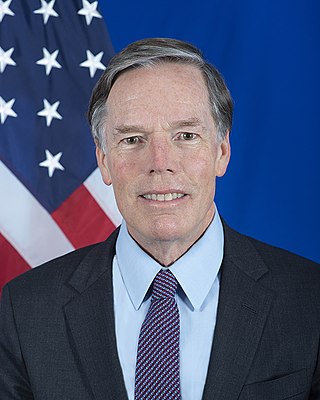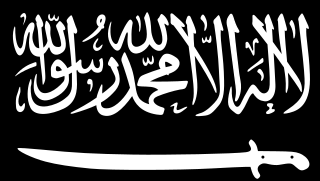
The United States National Security Council (NSC) is the principal forum used by the president of the United States for consideration of national security, military, and foreign policy matters. Based in the White House, it is part of the Executive Office of the President of the United States, and composed of senior national security advisors and Cabinet officials.

Akhmed Halidovich Zakayev is a Chechen statesman, political and military figure of the unrecognised Chechen Republic of Ichkeria (ChRI). Having previously been a Deputy Prime Minister, he now serves as Prime Minister of the ChRI government-in-exile. He was also the Foreign Minister of the Ichkerian government, appointed by Aslan Maskhadov shortly after his 1997 election, and again in 2006 by Abdul Halim Sadulayev. An active participant in the Russian-Chechen wars, Zakayev took part in the battles for Grozny and the defense of Goyskoye, along with other military operations, as well as in high-level negotiations with the Russian side.

Ashton Baldwin Carter was an American government official and academic who served as the 25th United States secretary of defense from February 2015 to January 2017. He later served as director of the Belfer Center for Science & International Affairs at Harvard Kennedy School.

Robert Nicholas Burns is an American diplomat and academic who has served as the United States ambassador to China since 2022.

Doku Khamatovich Umarov, also known as Dokka Umarov as well as by his Arabized name of Dokka Abu Umar, was a Chechen mujahid in North Caucasus. Umarov was a major military figure in both wars in Chechnya during the 1990s and 2000s, before becoming the leader of the greater insurgency in the North Caucasus. He was active mostly in south-western Chechnya, near and across the borders with Ingushetia and Georgia.

Matthew James Bryza is a former United States diplomat. His last post in the United States foreign service was the United States Ambassador to Azerbaijan.

Vladimir Socor is a Romanian-American political analyst of East European affairs for the Jamestown Foundation and its Eurasia Daily Monitor, currently residing in Munich, Germany. Socor's main specialization focuses on the political affairs and the ethnic conflicts of the former Soviet republics and the Commonwealth of Independent States.
Nikolai Ivanovich Getman or Mykola Ivanovich Hetman, an artist, was born in 1917 in Kharkiv, Ukraine, and died at his home in Orel, Russia, in August 2004. He was a prisoner from 1946 to 1953 in forced labor camps in Siberia and Kolyma, where he survived as a result of his ability to sketch for the propaganda requirements of the authorities. He is remembered as one of few artists who has recorded the life of prisoners in the Gulag in the form of paintings.
The threat of terrorism in Kazakhstan plays an increasingly important role in relations with the United States which in 2006 were at an all-time high. Kazakhstan has taken Uzbekistan's place as the favored partner in Central Asia for both Russia and the United States. Kazakhstan's counter-terrorism efforts resulted in the country's 94th ranking among 130 countries in the 2016 Global Terrorism Index published by the Institute of Economics and Peace. The higher the position on the ranking is, the bigger the impact of terrorism in the country. Kazakhstan's 94th place puts it in a group of countries with the lowest impact of terrorism.

The Caucasus Emirate, also known as the Caucasian Emirate, Emirate of Caucasus, or Islamic Emirate of the Caucasus, was a jihadist organisation active in rebel-held parts of Syria and previously in the North Caucasus region of Russia. Its intention was to expel the Russian presence from the North Caucasus and to establish an independent Islamic emirate in the region. The Caucasus Emirate also referred to the state that the group sought to establish. The creation of Caucasus Emirate was announced on 7 October 2007, by Chechen warlord Dokka Umarov, who became its first self-declared "emir".

Russia–Uzbekistan relations are the bilateral relations between Russia and Uzbekistan.

Evelyn Nicolette Farkas is an American national security advisor, author, and foreign policy analyst. She is the current executive director of the McCain Institute, a nonprofit focused on democracy, human rights, and character-driven leadership.

The insurgency in the North Caucasus was a low-level armed conflict between Russia and militants associated with the Caucasus Emirate and, from June 2015, the Islamic State, in the North Caucasus. It followed the official end of the decade-long Second Chechen War on 16 April 2009. It attracted volunteers from the MENA region, Western Europe, and Central Asia. The Russian legislation considers the Second Chechen War and the insurgency described in this article as the same "counter-terrorist operations on the territory of the North Caucasus region".

Andrew Carrigan Kuchins is an American political scientist, academic, and former head of American University of Central Asia. He has held senior positions at several think tanks, including Carnegie Endowment for International Peace, Center for Strategic and International Studies and Carnegie Moscow Center. Kuchins has written numerous books, articles, book reviews. He has been interviewed on mainstream and academic outlets including as CNN, Politico, The New York Times, The Washington Post, Washington Times, The Moscow Times, Chicago Tribune and CS Monitor. Additionally, Kuchins has given testimony before the United States Congress on Russia, Central Asia and the Caucasus.

The 2009 Nazran bombing occurred on 17 August 2009, in Nazran, the largest city of the Republic of Ingushetia in the Russian Federation. A suicide car bomber attacked police headquarters, and at least 25 people were killed and 164 injured. It was the most serious terrorist attack in Ingushetia in the early 21st century, where there had been social and political unrest related to independence movements.
Pavel Kimovich Baev is a Russian-Norwegian political scientist and security scholar. He is currently a research professor at the Peace Research Institute Oslo (PRIO) and a senior nonresident fellow at the Brookings Institution.

Robert James Woolsey Jr. is an American political appointee who has served in various senior positions. He headed the Central Intelligence Agency as Director of Central Intelligence from February 5, 1993, until January 10, 1995. He held a variety of government positions in the 1970s and 1980s, including as United States Under Secretary of the Navy from 1977 to 1979, and was involved in treaty negotiations with the Soviet Union for five years in the 1980s. His career also included time as a professional lawyer, venture capitalist and investor in the private sector.
Ariel Cohen is a political scientist focusing on political risk, international security and energy policy, and the rule of law. Cohen currently serves as the Managing Director of the Energy, Growth, and Security Program] (EGS) at the International Tax and Investment Center (ITIC), an independent, nonprofit research and education organization founded in 1993 to promote tax reform and public-private initiatives to improve the investment climate in transition and developing economies.

Stephen Brent Slick is a former Central Intelligence Agency (CIA) operations officer and United States National Security Council official. He is the inaugural director of the Intelligence Studies Project at the University of Texas at Austin, where he is also a Clinical Professor at the Lyndon B. Johnson School of Public Affairs and the Bobby R. Inman Chair in Intelligence Studies.














